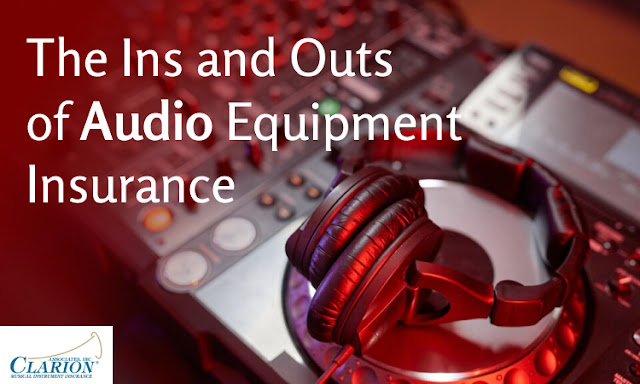The significance of audio equipment cannot be overstated for audio enthusiasts. Whether you're an avid music lover or a live event coordinator, having the right audio gear is essential for an unparalleled experience. This guide provides a brief overview of audio equipment insurance. You can use it to protect your equipment for various things.
Types of Audio Equipment
Before learning about the audio equipment coverage policy, you should learn what instruments fall into this category. Here are the different types of audio equipment, including:
• Audio Sources
At the heart of any audio system lie the sources, ranging from vinyl records and CD players to digital streaming platforms. Understanding the strengths and nuances of each source allows individuals to tailor their audio setup to their unique preferences.
• Microphones
From studio recordings to live performances, microphones play a pivotal role in capturing the nuances of sound. Different types of microphones cater to specific needs, be it vocal clarity, instrument precision, or ambient noise suppression.
• Audio Mixers
Audio mixers serve as the control center for manipulating sound elements. Whether blending multiple audio sources for a live show or fine-tuning a recording in the studio, the versatility of audio mixers makes them a fundamental component of any setup.
• Amplifiers
Amplifiers elevate the power of audio signals, ensuring they reach their full potential. Understanding the power requirements of speakers and matching them with suitable amplifiers is crucial for achieving optimal sound quality.
• Speakers
Speakers are the final frontier in delivering sound to the listener's ears. With many options available, from bookshelf speakers to towering floor-standing models, selecting the right speakers depends on room size, acoustic properties, and personal preferences.
What Falls Under the Coverage of Audio Equipment Security?
Audio equipment security extends beyond the realm of theft, covering a spectrum of potential risks:
• Theft
Protecting your equipment from theft is a primary concern, especially for transporting gear to various locations.
• Vandalism
The risk of intentional damage is present in public spaces or shared environments. Vandalism coverage ensures financial protection in such unfortunate scenarios.
• Fire
The fire threat can pose a significant risk to audio equipment, necessitating coverage to mitigate potential losses.
• Water Damage
Whether from floods, leaks, or accidental spills, water damage coverage safeguards against water's corrosive effects on sensitive electronics.
• Accidental Damage
Drops, falls, and other mishaps can happen unexpectedly. Coverage for accidental damage ensures that repairs or replacements are covered in the event of an unfortunate incident.
Preventing Audio Equipment Damage
While insurance provides financial protection, you can follow these preventive measures to significantly reduce the likelihood of damage:
• Secure Storage
Store your equipment in a secure and controlled environment to minimize exposure to potential risks when not in use.
• Regular Maintenance
Conduct routine checks and maintenance to identify and address issues before they escalate.
• Invest in Protective Cases
Transporting equipment becomes safer by using sturdy cases designed to withstand shocks and vibrations.
• Surge Protection
Employ surge protectors to safeguard your equipment from power fluctuations and electrical surges.
Setting Up an Audio System
Building an audio system involves acquiring the latest and greatest equipment. It requires a thoughtful approach:
• Choosing the Right Equipment for Your Needs
When selecting audio equipment, consider factors such as intended use, room size, and personal preferences. Tailoring your setup to your specific needs ensures a satisfying audio experience.
• Connecting Your Equipment
Proper cable management and an understanding of signal flow are essential for setting up an efficient and effective audio system. Attention to detail during the setup process contributes to the longevity and performance of your equipment.
Conclusion
Protecting your investment cannot be overstated in the grand symphony of audio appreciation. Audio equipment insurance offers a safety net against unforeseen circumstances, ensuring your gear remains pristine. To embark on this journey of safeguarding your sonic haven, explore different options that align with your specific needs. The harmony of a well-protected audio system resonates in the quality of sound and the peace of mind it brings.






